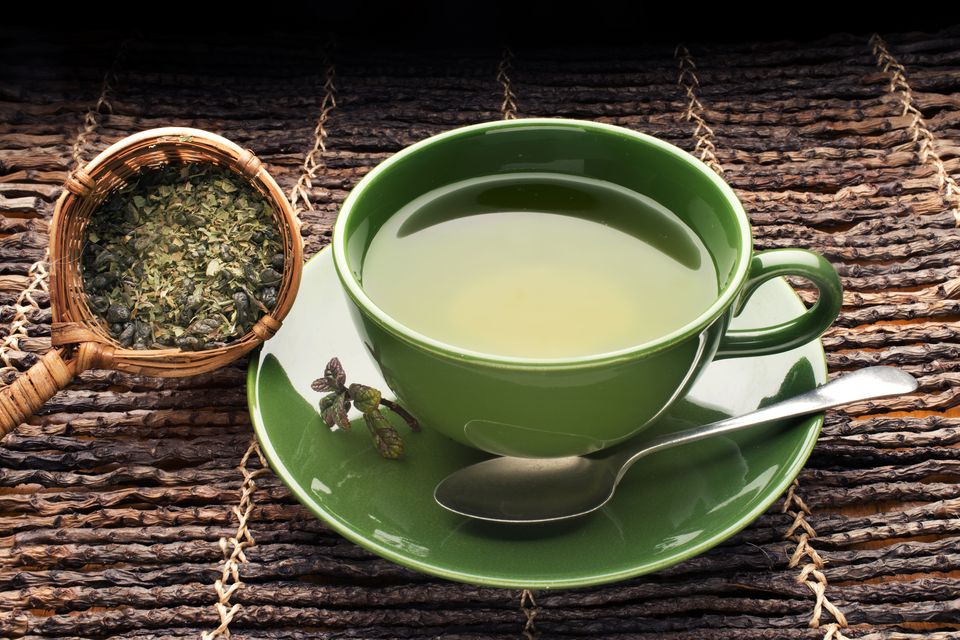‘Helps to burn fat’; ‘protects against cardiovascular disease’; ‘lowers risk of type 2 diabetes’; ‘positive effect on cholesterol’ – these are all claims circulating about green tea. Its consumption is said to lead to weight loss and prevent heart problems. But is this really true? Here, the experts share their views.
What is the difference between green and black tea? Both come from the leaves of the ‘camellia sinensis’ tea plant. “The only difference is that the leaves are processed differently,” explains Michaël Sels, dietician and innovation manager of clinical nutrition at Antwerp University Hospital (UZA). “For green tea, they are dried and steamed immediately after picking.

For black tea, the leaves are fermented by exposing them to oxygen.” As for the content of theine (caffeine), a 250ml bag of black tea contains an average of 30mg of caffeine, while for green tea it is slightly lower at around 20mg per bag. “As with coffee, factors such as infusion time, how fine the tea leaves are and water temperature can influence the final caffeine concentration,” explains Nele Steenackers, dietician and nutrition researcher at KU Leuven and Maastricht University.
“In contrast, a 200ml cup of brewed coffee contains an average of 90mg of caffeine, depending on the type of coffee and brewing method.” It’s also important to know that other types of ‘tea’, such as chamomile or ginger tea, are in fact infusions. Strictly speaking, you shouldn’t call them tea, because they don’t come from the tea plant, but from dried herbs.
Is green tea healthier because of the brewing process? “When you oxidise the leaves for black tea, some substances disappear,” explains Sels. “So in green tea, you can expect to find slightly higher levels of antioxidants or polyphenols such as catechins. The beneficial substances are better preserved.
” Green tea hydrates and is calorie-free. Surely that’s healthy? “It is,” agrees Sels. “Many of us don’t drink enough water.
The fact that tea leaves give water more flavour can certainly help to address that. Many of us don’t drink enough water. The fact that tea leaves give water more flavour can certainly help to address that “Green tea is indeed low in calories.
Of course, you then have to drink your green tea pure and not with sugar. In that sense, you should definitely be wary of fads like bubble tea, where sweets float in your tea.” Read more An epidemiological study from the US found that adults who drink three to five cups of green or black tea daily live an average of 2.
24 years longer than non-tea drinkers. “This is based on associations and does not prove a direct causal relationship,” Steenackers points out. “An important caveat for all possible health effects is that the composition of tea varies according to growth, harvesting, drying and preparation.
“Tea brewed in boiled water contains relatively low levels of catechins and caffeine, while concentrated extracts in capsules contain much higher amounts.” It is said that green tea reduces the risk of type 2 diabetes by improving insulin sensitivity and reducing blood sugar levels. What does the science say? “Although studies in animals indicate beneficial effects of the polyphenols in green tea on glucose metabolism, studies in humans show mixed results.
Some studies report a slight improvement in blood sugar levels, while others find no significant effects,” says Steenackers. “There is currently insufficient conclusive evidence to confirm a direct beneficial effect of green tea on diabetes risk.” Can green tea help you to lose weight? The catechins and caffeine in green tea are often cited as mechanisms behind increased energy burning, but meta-analyses show minimal weight loss.
“A systematic review by Cochrane concluded that green tea may cause a small but statistically non-significant weight loss in overweight or obese adults,” says Steenackers. “We therefore consider that effect as not clinically relevant.” If you make unhealthy choices, but drink tea in the morning, you’re not going to change much about the obesity problem Sels adds: “The studies showing that the antioxidants in green tea stimulate enzymes that can lead to fat breakdown were done in combination with exercise.
“Regular tea drinkers often seem to already have a healthy lifestyle, and then you naturally reinforce those health benefits. If you make unhealthy choices, but drink tea in the morning, you’re not going to change much about the obesity problem.” What about the claim that green tea protects you from cardiovascular disease? Research suggests that both green and black tea have beneficial effects on cardiovascular risk factors such as cholesterol and blood pressure.
“Due to the methodological limitations of the studies, however, the evidence base is unsatisfactory,” says Steenackers. “Long-term qualitative studies are needed to demonstrate protection against cardiovascular disease in addition to the positive effect on risk factors.” Green tea seems harmless – are there any side effects worth mentioning? Tea consumption is generally considered safe, but highly concentrated green tea extracts (eg catechins) in dietary supplements can lead to stomach upset, insomnia and skin reactions, among other things.
Supplements containing green tea extracts that are too highly concentrated are not recommended “Supplements containing green tea extracts that are too highly concentrated are not recommended,” concludes Steenackers. What’s the conclusion? The effect of green tea on weight loss is negligible. With regard to cardiovascular risk factors such as cholesterol and blood pressure, green tea has a beneficial effect, but further research is needed to further substantiate this for cardiovascular disease.
Apart from that, green tea is a healthy product that can have a place in our diet. Read more.
Entertainment

The truth about green tea: Does it really help to burn fat and lower your cholesterol?

‘Helps to burn fat’; ‘protects against cardiovascular disease’; ‘lowers risk of type 2 diabetes’; ‘positive effect on cholesterol’ – these are all claims circulating about green tea.















